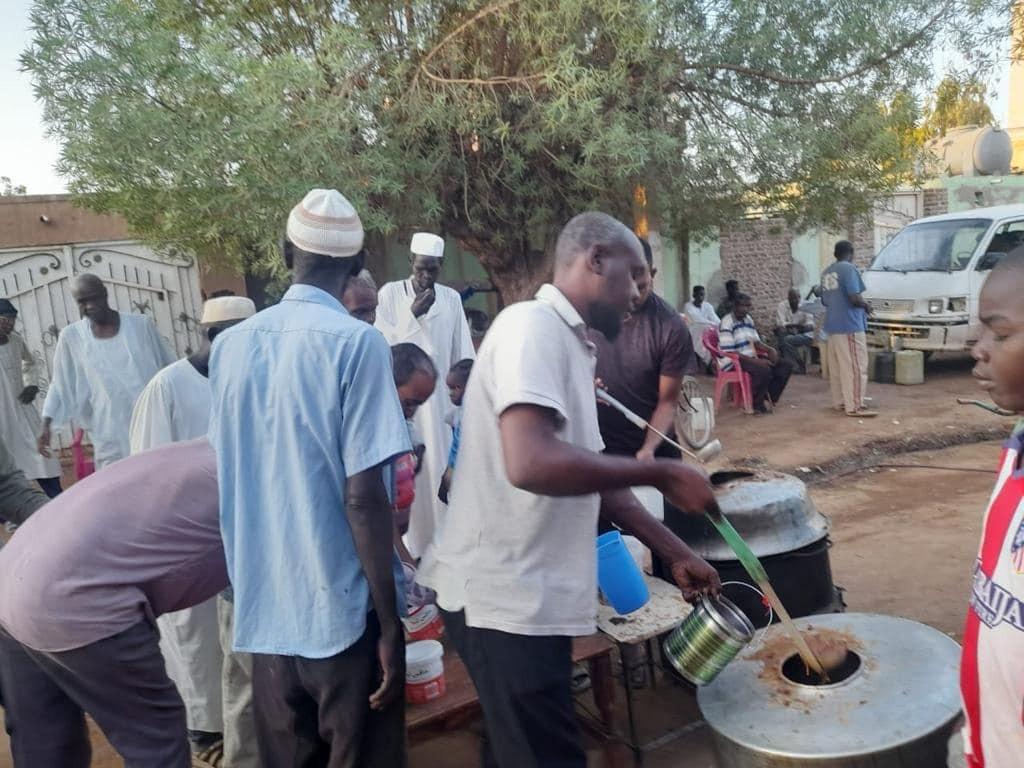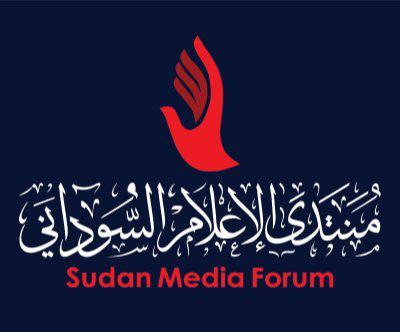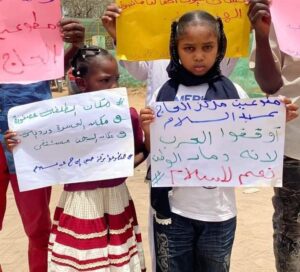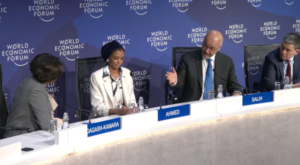Targeting volunteers: Lifesavers face cyberwar in Sudan

Soup kitchens, in Arabic known as takaya, are one of the social solidarity systems in Sudan (File photo: RD)
Report by Ayin Network for Sudan Media Forum
Emergency room volunteers and revolutionary resistance committees in Sudan are facing a massive digital war, their activity and communication online and social media platforms is monitored, in a way that has cast a negative shadow on their fundraising efforts to provide food to people affected by the armed conflict across the country.
Behind the screens of mobile phones, emergency room volunteers run a large-scale activity to collect donations and coordinate among themselves to provide relief to civilians amid the war, but the cyberspace in which they move has become full of dangers, as they are tracked, monitored, and then arrested, and some social media applications such as WhatsApp have been restricted by the Sudanese government, led by the army, which has hindered the activity of volunteers.
Since the outbreak of the war between the army and the Rapid Support Forces (RSF) on April 15, 2023, the “Emergency Response Rooms” is a network of thousands of volunteers, which has been active in providing food through free kitchens “Takaya” to civilians affected by the armed conflict through simple symbiotic efforts, and they have been subjected to harassment, arrest, beatings, and even killings, from parties to the conflict.
As a result of their efforts to protect the right to life of the Sudanese public, emergency room volunteers have won four international awards this year, namely the Nobel Alternative Prize, presented by the Swedish Right to Life Foundation, the Norwegian Rafto Prize, the European Union Prize for Human Rights, and the Richard C. Holberg International Advocacy Prize, and were nominated by the Peace Research Institute in Oslo for the Nobel Peace Prize, which was announced in the Norwegian capital Oslo on October 10.
As emergency rooms continue to receive global recognition awards in recognition of their role, Sudanese authorities continue to restrict them, not only on the ground, but also in the virtual online world.
Rescue
“Digital platforms are an essential means of fundraising in order to prepare food and save peoples’ lives, but they have become a source of great concern and threat for volunteers,” says a volunteer in Khartoum.
Osama Azhari, a member of the Khartoum Emergency Room, told Ain: “The digital activity of emergency rooms is focused on the use of social media to communicate with each other and support individuals, in addition to holding online meetings to coordinate voluntary work, as online platforms have become an arena for work, organisation, fundraising, and the delivery of relief supplies, as well as locating injured civilians and evacuating them to medical facilities to receive treatment.”
However, digital platforms, as the primary means used by emergency rooms to save the lives of civilians in areas of armed conflict, have become a major concern and challenge for volunteers, given the risks involved, Azhari said.
On July 25, Sudan’s military-led government imposed a ban on voice calls via WhatsApp, as a result of what it called security threats and the protection of national security. The Sudanese public, including volunteers, have resorted to using block-breaking apps and programs such as VPNs and others in order to benefit from social media services.
Osama Azhari, a member of the Khartoum Emergency Room, points out that the partial ban on WhatsApp did not only affect communication, but also included restrictions on sending photos and videos, which will hinder the process of documenting and sharing crimes and violations against civilians, as documentation is not a media luxury, but is required as important evidence of the crime and a basis for accountability, a memory that protects against oblivion, and that its disruption indicates a desire to obfuscate and obscure the atrocities of war from the world, as he described it.
“This digital censorship has made the environment of voluntary work in Sudan more terrifying, despite the fact that activists have resorted to using digital security applications and unblocking, but concerns are still present in light of the lack of a wall of trust,” he added.
Handling of digital traffic
As the digital risks to volunteers increased, they did not have organised protection plans and did not receive training in digital safety, making them vulnerable to falling into the trap of the Sudanese authorities, a member of the Bahri emergency rooms north of the capital told Ain.
The volunteer, who asked not to be named due to security risks, adds: “We don’t actually have any structured digital security measures. This is the reality clearly. The procedures applied are mostly spontaneous, rather than codified, formal, or regulated. Anyone can take their own precautions in the way they see fit.”
“We have to admit that as a Sudanese society we have a lack of technical culture; we don’t understand very well the security measures we can apply, so the most we do is use VPNs and encrypt our calls, and this is the maximum our knowledge and abilities allow, but there are no formal or regulatory measures, it’s up to individual jurisprudence,” he said.
For his part, social activist Ahmed Othman said that “the work of emergency rooms, committees, and all workers in Sudan in light of the current situation needs a lot of care, because any mistake can lead to your life or arrest, or cause damage to the system with which they work completely, which requires raising awareness of the digital means they use.”
“Heroic work is not done without paying a price, we are systematically targeted, harassed and censored, digital platforms are our means of fundraising, and when phones stop, life is disrupted,” says a social activist.
Othman added: “We are facing unimaginable logistical challenges, in addition to systematic targeting, restriction and censorship. The disruption of internet and communication services is not just a nuisance; it is an attempt to isolate us and hide our work, as aid networks rely on these tools to coordinate the evacuation of the injured, identify areas in need of urgent assistance, secure simple funding routes, and when the phone goes silent, rescue mechanisms stop.”
Politicisation of relief
“This restriction has no purpose other than to politicise relief and stop the hand of aid that reaches people in a neutral and effective manner, and to put it under official or military authority,” Othman stresses. “Any attempt to censor or supervise our free voluntary work is, in essence, a death sentence for thousands of communal kitchens and mobile clinics,” he says.
Activists and volunteers face the risk of arrest, enforced disappearance, and murder simply for delivering a bag of flour or a tape of treats. These measures create a climate of fear that threatens to dismantle and weaken their networks, “but the determination of al-Shabaab is stronger than any weapon.”
The censorship negatively affected the volunteers’ response speed and ability to scale, and made every logistical mission look like a military operation. But it has also strengthened the resilience and creativity of volunteers, who are now relying on faint signals, verbal messages and individual efforts to ensure the flow of help continues, Othman said.
Beyond the logic of numbers, a member of a naval emergency room, who asked not to be named, explains the way to measure the impact of their work, which reflects the depth of popular engagement, and the mobilisation of the values of social solidarity to help those affected by armed conflict.
Perhaps the most dangerous aspect of this digital battle is its direct impact on the psychological state of activists. Psychology professor Dr. Abdullah Adam told Ayen that “the psychological and security challenges facing activists today are deep and complex, starting with possible security breaches of their devices, to real fears of assault, arrest, and imprisonment. This fragile security environment is putting a lot of pressure on volunteers.”
Psychological disorder
According to Abdullah, this situation is exacerbated by modern surveillance practices, from comprehensive technical surveillance to monitoring social media sites, Facebook, calls and apps such as WhatsApp in Sudan. All of this creates a harsh psychological reality, based on a constant sense of threat and fear of being kidnapped or arrested, according to him.
“These practices cause a psychological disorder that manifests itself in the form of obvious symptoms: fear, stress, and extreme anxiety. The individual may live in a state of hypervigilance and obsession, where he is controlled by the obsession with constant surveillance, whether of his phone or his means of communication. This constant intimidation and fear leads to a state of hypersensitivity that may develop into obsessive-compulsive disorder, which is one of the most prominent psychological consequences of security challenges related to surveillance, intimidation, and enforced disappearance.”
“As a result of this security concern, activists are facing the challenge of digital burnout that generates mental and emotional exhaustion. Social media platforms are designed to activate the hormone dopamine associated with mood and emotional stimulation. This massive digital consumption is draining our emotional balance, causing emotional exhaustion, as the photos, videos, and content we see impose a great emotional diversion on us that profoundly affects our mental health.”
Sudanese activists are working under the fire of physical and psychological danger, turning communication tools into relief trenches. Their digital resilience is as much as they are on the ground, and the fragility of their technical security is an indication of how much sacrifice they are making to keep the spark alive in a turbulent Sudan.
This report compiled by Ayin Network is published via the platforms of the Sudan Media Forum and its member institutions to shed light on the digital war facing the volunteers of the emergency rooms in Sudan, and the security surveillance, harassment, arrest, and even murder they are subjected to, just because of their relief work online, while they are honoured by international institutions. It shows how digital platforms have gone from a means of saving lives to a source of danger and threat, in the absence of digital protection.

Find the Sudan Media Forum on Facebook and on X: #StandWithSudan #SilenceKills #الصمت_يقتل #NoTimeToWasteForSudan #الوضع_في_السودان_لايحتمل_التأجيل #Stand #SudanMediaForum











 and then
and then